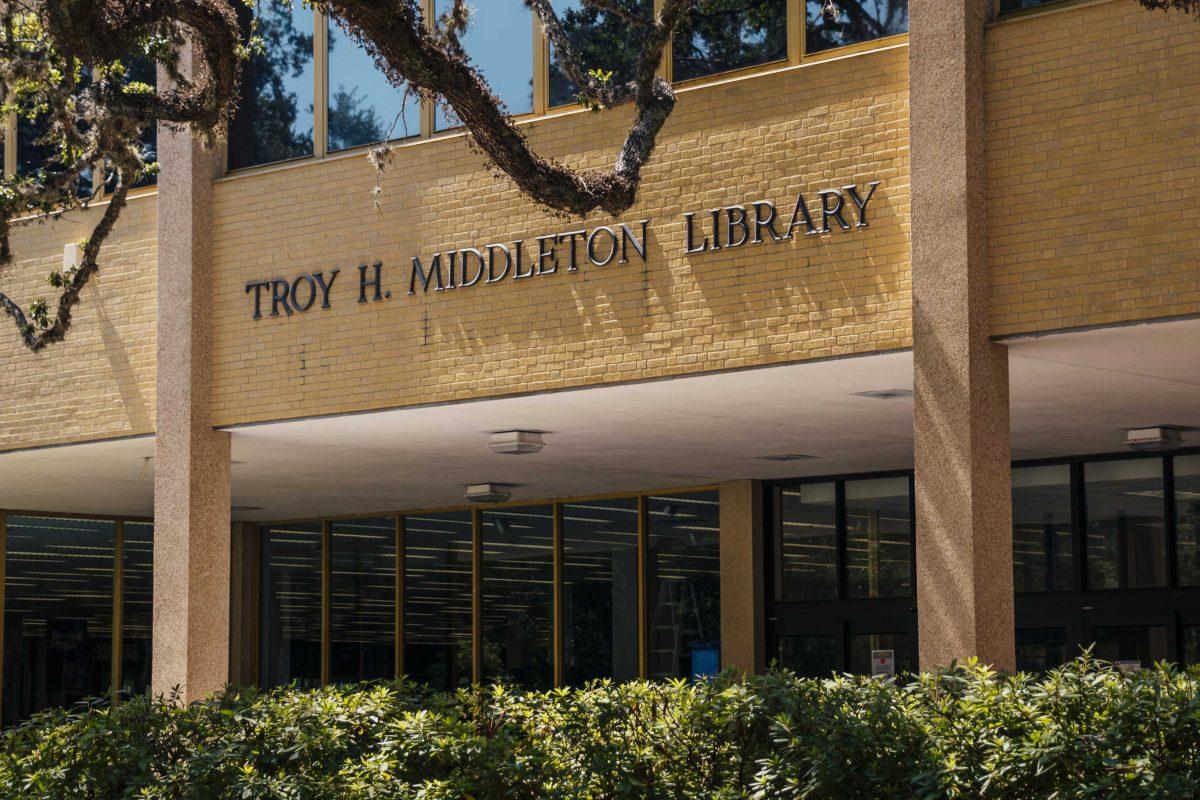The yellow brick wall above the doors of LSU Library has been blank since June, when the Board of Supervisors approved to the removal of the name Troy H. Middleton.
The renaming of the LSU Library fueled many students to advocate for the renaming of 14 additional LSU buildings, many of which are named after Confederate leaders.
The removal of Confederate monuments, memorials and symbols has been an ongoing controversy not only on LSU’s campus, but throughout the United States.
LSU history professor Gaines Foster, who has written multiple books and lectures on Southern history, said that “the most important thing” for the United States to do is come to terms with why the Civil War was fought.
“The problem is there’s still not a consensus in America,” Foster said. “Either that the war is about slavery, if you look at polling data on that it’s about 55:45 with more people saying slavery, though. If you ask the question another way, states’ rights wins. American society has never come to terms with the meaning of a Civil War.”
Foster said the Confederate flag is an “interesting case” due to differences in demographics and public perception of the flag compared to 1861 or 1865.
“Obviously, the South, with its history of the Confederacy, still has some emotional ties and family ties to some past into the Confederacy that makes Confederate symbols evocative for some white Southerners,” Foster said. “But if you look at the polling data on support for the flag, you’ll find that it’s no longer purely regional.”
Foster discussed the distinction between honoring the sacrifice and honoring “the Southern cause” of Confederate soldiers during the Civil War.
“I think one of the most complex issues for any society is how do you deal with acknowledging the sacrifice of individuals without embracing the cause,” Foster said. “That’s the tricky part about the Confederate monuments. You can respect to a certain extent the sacrifice. Does that mean you have to embrace the cause?”
Foster said that building name changes are “equally tricky” as taking down Confederate monuments. Foster used the examples of high schools named in the 1950s and 1960s “as part of a reaction against the Civil Rights movement.”
“You need to ask yourself questions about why they were named and who they’re named after on an individual basis,” Foster said. “I think a general celebration of the Confederacy, which is what some of those names weren’t up to do, is something we certainly need to eliminate. I think the University really needs to sit down and assume this is what the community is doing and figure out what our standards are for naming buildings.”
History senior President of the LSU Society of Student Historians, Beau Clark, said he believes that buildings representing “figures who elicit feelings of exclusion” should be renamed.
“It is my personal belief that LSU should involve the entire student body in the discussion of renaming buildings on LSU’s campus and potential names should be selected by a merit-based process regarding the individual’s significant contributions to LSU’s academic endeavors, campus development and student life,” Clark said.
Clark said although he agrees with the renaming of LSU buildings, people should be cautious of “falling into the trap of presentism.” Clark also said that the best solution is to “find a middle ground” between respecting University students’ opinions and not perceiving historical figures strictly through our modern perspective.
Clark does not believe the removal of Confederate symbols is an erasure of history, but said “the role the Confederacy played in US or Louisiana history,” should not be forgotten.
“The Confederates were in open rebellion against our Union and should not be venerated for fighting against our country,” Clark said. “Removing these figures and symbols does not erase the harm caused by the message they represent, but it would make a statement that LSU is committed to creating an inclusive community.”
Scott Madere, president of LSU History Graduate Association and a fourth year Ph.D. student who researches modern European history, said he’s “not particularly worried” about the removal of Confederate symbols being an erasure of history.
“As long as there are past events to examine and people who are passionate about interpreting the past, we will always have fresh, differing viewpoints on history,” Madere said. “I’ve personally studied the writings of dead people for thousands of years and those whose viewpoints and opinions were roundly persecuted in their time. If their viewpoints weren’t erased by age or lack of interest, neither will anyone else’s in the future.”
Madere said communities have a right to decide what their collective values are and the ways they should be expressed.
“If a community decides together that modifications to their physical environment like building names are necessary to reflect their values, then they should have that right to change names,” Madere said.
Foster said it is important for there to be “a healthy debate” on whether or not to rename LSU buildings or take down Confederate monuments.
“I think every community needs to deal with this as well,” Foster said. “I mean, my hope would be that a debate over the monument becomes an occasion, or the debate over the name of the building. The changes itself may not be as important as the fact that we have the debate that helps us understand our history.”








